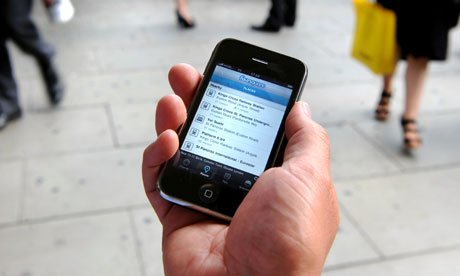Via Guardian UK - Location-based mobile services have been available for the best part of a decade, initially in the form of simple "find my nearest" services offered by mobile operators to guide their customers to bank machines, bars and other public spots. Most of these services failed to take off.
In the apps era, it has been a different story. Recent generations of smartphones with GPS chips inside allow their users to choose to share their location with any app that requests it. The result has been a boom in location-based apps, from mapping and navigation through to social networking services such as Foursquare and Facebook Places.
HaptiMap is a project funded by the European Commission under its Co-operation Programme ICT, which aims to make maps and location services more accessible.
"If you are walking or cycling, and don't want to (or are unable to) spend most of the time focusing on a screen, the use of mobile devices tends to be a frustrating experience. The same is true in bright sunlight or if your eyesight just isn't good enough to see every detail on the mobile screen," explains its website.
"The HaptiMap project is aimed at making maps and location-based services more accessible by using several senses like touch, hearing and vision. Our end goal is to increase the number of persons who are able to use mainstream map services. Thus our user group contains both sighted persons and persons with visual impairments (including elderly persons)."
HaptiMap has two main strands. It develops tools to help developers make their location-based apps more accessible, and it also produces guidelines and extensions to existing design practices to raise awareness of accessibility issues.
In October 2011, HaptiMap released an iPhone app called HaptiMap HCI-Module Demo. Its aim is to show developers how the project's HCI modules can be implemented using its toolkit, including a Geiger-counter sound module, a tactile compass and a hardware interface for external devices.
Developer GeoMobile has also made apps showing the commercial potential of apps developed using HaptiMap's toolkit. Juicy Beats is an events guide with a friend-finding feature that is accessible for blind users, providing vibration and sounds to help users navigate towards friends who share the system. More than 5,000 people downloaded it from Apple's App Store, with 750 registering and using the HaptiMap Friend Finder module.
Meanwhile, Tandem is a tour guide aimed at a two-person team – one blind, one sighted – riding a tandem bike, with the blind person handling navigation using verbal prompts.
HaptiMap may well encourage a wider focus on accessibility from developers making location-based apps. This will be helped by its development of a workbook that aims to get developers incorporating "accessibility considerations and practices into their everyday design and development work".
In the apps era, it has been a different story. Recent generations of smartphones with GPS chips inside allow their users to choose to share their location with any app that requests it. The result has been a boom in location-based apps, from mapping and navigation through to social networking services such as Foursquare and Facebook Places.
HaptiMap is a project funded by the European Commission under its Co-operation Programme ICT, which aims to make maps and location services more accessible.
"If you are walking or cycling, and don't want to (or are unable to) spend most of the time focusing on a screen, the use of mobile devices tends to be a frustrating experience. The same is true in bright sunlight or if your eyesight just isn't good enough to see every detail on the mobile screen," explains its website.
"The HaptiMap project is aimed at making maps and location-based services more accessible by using several senses like touch, hearing and vision. Our end goal is to increase the number of persons who are able to use mainstream map services. Thus our user group contains both sighted persons and persons with visual impairments (including elderly persons)."
HaptiMap has two main strands. It develops tools to help developers make their location-based apps more accessible, and it also produces guidelines and extensions to existing design practices to raise awareness of accessibility issues.
In October 2011, HaptiMap released an iPhone app called HaptiMap HCI-Module Demo. Its aim is to show developers how the project's HCI modules can be implemented using its toolkit, including a Geiger-counter sound module, a tactile compass and a hardware interface for external devices.
Developer GeoMobile has also made apps showing the commercial potential of apps developed using HaptiMap's toolkit. Juicy Beats is an events guide with a friend-finding feature that is accessible for blind users, providing vibration and sounds to help users navigate towards friends who share the system. More than 5,000 people downloaded it from Apple's App Store, with 750 registering and using the HaptiMap Friend Finder module.
Meanwhile, Tandem is a tour guide aimed at a two-person team – one blind, one sighted – riding a tandem bike, with the blind person handling navigation using verbal prompts.
HaptiMap may well encourage a wider focus on accessibility from developers making location-based apps. This will be helped by its development of a workbook that aims to get developers incorporating "accessibility considerations and practices into their everyday design and development work".

Post a Comment